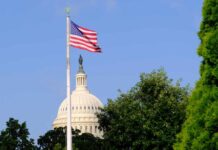
President Trump’s sweeping deployment of federal authority in Portland has reignited the constitutional battle over local control and the right to restore order amid escalating unrest.
Story Snapshot
- Trump ordered 200 National Guard troops to Portland to safeguard federal assets and quell unrest.
- Oregon’s governor and Portland officials fiercely opposed the deployment, citing federal overreach and potential escalation.
- Legal actions and public protests erupted, spotlighting tensions between federal power and state autonomy.
- This standoff marks a pivotal test of constitutional limits and the future of law enforcement in American cities.
Federal Authority Asserted Amid Urban Unrest
President Donald Trump, determined to restore law and order after years of unchecked protests and rising violence in major cities, ordered the deployment of 200 Oregon National Guard members to Portland. The decision was prompted by persistent demonstrations targeting federal facilities and growing reports of “organized political violence” threatening public safety. Trump’s administration framed the situation as a defense of federal property and officials, while also signaling a broader intent to challenge the permissive policies of local progressive leadership.
Oregon’s governor, Tina Kotek, along with Portland city officials, immediately denounced the move as an unnecessary and provocative escalation. They argued that the city was not, as Trump described, “war-ravaged,” and insisted that local authorities were managing the situation. Their opposition culminated in a lawsuit seeking to block the National Guard deployment, highlighting the deep rift between state governments and the federal executive branch on issues of policing and public safety.
Watch: What do Americans think of ICE? Harry Enten looks at polling
Roots of the Showdown: Portland’s Legacy and the Rise of Federal Intervention
Portland’s reputation as a hotbed of activism and protest, especially around immigration and police practices, has made it a focal point for federal attention. The Trump administration’s decision was not without precedent; previous deployments of federal forces, including the Protecting American Communities Task Force (PACT) in 2020, had already ignited national debate over the role of federal agents in local law enforcement. The current deployment followed a pattern of federal responses to unrest in other cities, such as Los Angeles and Washington, D.C., reinforcing Trump’s campaign promise to take decisive action wherever local jurisdictions failed to uphold order.
Trump’s Plan to Send Troops to Portland, Oregon, Prompts Frustration
President Trump has made Oregon’s largest city a frequent target of both his rhetoric and his policies. Many residents are rolling their eyes.https://t.co/4PkpTDgJVo pic.twitter.com/RKQVKYwH5U
— Cornelius (@cornelius_cen) September 28, 2025
Broader Ramifications for Law Enforcement and Civil Society
The standoff in Portland is more than a local dispute; it reflects a broader national reckoning over the limits of federal authority, the responsibilities of local officials, and the enduring importance of constitutional protections. For many conservatives, Trump’s actions represent a long-overdue stand against the erosion of law and traditional values in America’s cities. The legal and political repercussions of this episode will likely shape debates over federalism, public safety, and civil liberties for years to come, as communities across the nation grapple with the consequences of unchecked unrest and assertive federal action.
As the courts weigh the legality of the deployment and local leaders continue to rally opposition, the eyes of the country remain fixed on Portland. The outcome will not only determine the immediate future of the city but also influence the trajectory of federal-state relations and the balance of power in American democracy. For families, business owners, and law-abiding citizens seeking stability and security, the resolution of this standoff holds profound significance for the future of their communities and the enduring strength of the Constitution.
Sources:
From passing mention to deployment: A timeline of Trump’s pressure on Portland
2020 deployment of federal forces in the United States

























